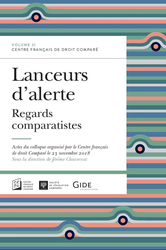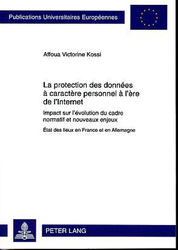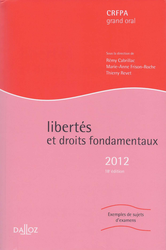Sept. 8, 2021
Thesaurus : Doctrine
► Référence complète : G. Davy, "Le mythe des lois de saint Óláf et l’invention des loisfondamentales dans la Norvège médiévale", Cahiers de civilisation médiévale 2021/3 n° 255, pp.197-210, Éditions Université de Poitiers.
____
🦉Cet article est accessible en texte intégrale pour les personnes qui suivent les enseignements du professeure Marie-Anne Frison-Roche.
________
May 28, 2020
Publications

Full reference: Frison-Roche, M.-A., L'impossible unicité juridique de la catégorie des "lanceurs d'alertes" ("The impossible legal unicity of the category of "whistleblowers""), in Chacornac, J. (dir.), Lanceurs d'alertes, regards comparatistes, ("Whistleblowers, comparative perspectives"), Publications of the Centre français de droit comparé ("French Comparative Law Center"), May 2020, Volume 21, p.13-31.
Read the article (in French).
Read the general presentation of the collective book in which this article is published
Read the bilingual working paper which had served of basis for this article.
Read the presentation of the conference "Les lanceurs d'alertes: glose" (Whistleblowers: glose") and especially the slides elabored for the colloquium organized by the Centre français de droit comparé ("French Comparative Law Center") on 23th of November 2018 under the direction of Jérôme Chacornac
____
Introduction of the article
"Whistleblowers". This is a new expression. Which is a great success. Barely heard once, we hear it everywhere ...
A topic not of course or knowledge test, but rather a topic of daily conversation. Because it is spoken to us every day, in more or less gracious terms. For example President Donald Trump on October 1, 2019 declared to the press "want to question" the whistleblower who would have illegally denounced him and would not, according to him, have the right to conceal his identity, proof in this according to him of the lying character of his assertions against him, while his lawyer indicates on October 6, 2019 that he is not speaking on behalf of a single whistleblower thus taken to task but of a plurality of people who gave information against the President of the United States. Even the most imaginative screenwriters would not have written such brutal and rapid twists and turns. Spectators, we are waiting for the next episode, secretly hoping for the escalation.
And precisely if we go to the cinema, it is still a whistleblower whose dedication and success, we are told about, even the drama, for the benefit of global society, and in particular democracy, since the secrets are fought for the benefit of the truth. The Secret Man designates Mark Felt as the first whistleblower. Returning to what we often present as being a more "serious" media!footnote-1391, we listen to France-Culture and here is another story told by a historian who worked as an archivist on events that political power would have liked to keep hidden by possibly destroying their traces but which its trade led to preserve: here it is expressly presented to the studious listeners like a "whistleblower" .... While the same radio tries to find the one who could well be, as in a kind of contest the "first whistleblower"!footnote-1727? .... This rewriting of History can be defended because ultimately what did other Voltaire do for Calas, or Zola for Dreyfus?
It is also a subject of legislative discussion since in the United States the Dodd-Frank law of 2010 inserted in the law of 1934 which established the Securities & Exchanges Commission a complete device of remuneration and remuneration of the whistleblowers, whereas after having developed flexible but guiding lines in this regard in 2012!footnote-1698, the European Commission published on November 20, 2018 the text of what will become a Directive intended to give a unified European status to the character, in the system gradually developed to protect the one who was presented in 2018 as that "cannot be punished for having done what is right".
In Europe, the Directive first approved by a Resolution of the European Parliament on April 16, 2019 on the protection of persons denouncing breaches of Union Law and then adopted on October 7, 2019 (Directive of the European Parliament and of the Council of European Union on the Protection of Persons who Report Violations of European Union Law, different title, it should be noted, will have to be transposed into the laws of the Member States within the next two years. , since only "violations of Union Law" are targeted, but the character of the "whistleblower" is more generally targeted: he is "whole"!footnote-1699.
In short, the whistleblower is a star!footnote-1390. A sort of historical figure, covered in blows and glory, going from Voltaire to Snowden, both of whom find themselves embodied on the screens!footnote-1681 ....,
Consecrated by law, which associates with it a legal regime of protection to such an extent that, like a Nessus tunic, it is this legal regime which will define the character and not the reverse. When we read the law of December 9, 2016 relating to transparency in the fight against corruption and the modernization of economic life, known as "Sapin 2", we notice that the Legislator makes much of this character, since 'he dedicates its chapter II to him!footnote-1682: "From the protection of whistleblowers", and that it is by his very protection that he formally opens the door of Right to him.
But why a plural? Admittedly when we read the recitals of the Community Directive of October 7, 2019 on the protection of whistleblowers!footnote-1702, it is only a list of all the subjects on which it is a good idea to protect them, which therefore prompts us to see in this plural only the index of this non-exhaustive list of subjects which it is good to tell us, a sign of the lack of definition of who should alert us. Reading the French law known as "Sapin 2" makes it less severe but more perplexing. Indeed, this plurality referred to by the title of the chapter devoted to "whistleblowers", there is no longer any question in the rest of the law, in the very definition which follows, article 6 which opens this chapter devoted to "whistleblowers" offering the reader immediately a singular since it begins as follows: "A!footnote-1684 whistleblower is a person ...". No mention of diversity. The art of legislative writing would however have required that the qualifying article not only be singular but that it should not yet be undefined. Stendhal if he had still deigned to have the law for bedside book would have wanted to find at the beginning of chapter a sentence like: "The!footnote-1683 whistleblower is a person ...".
Thus seem to contradict themselves within the law "Sapin 2 the very title which presents the character, in that it uses a defined plural (the) while the defining article which presents it is in the undefined singular (one). ...
Here is a first reason not to advance any more but in a very careful way, in this "step by step" that constitutes a reading word for word: a gloss. This consists of taking the expression itself literally. The second reason for this technical choice is that the gloss is well suited to the introduction of a collective work, thus allowing more targeted developments to take place in other contributions, on the techniques, the difficulties and the limits of this protection, or on its history, or the reasons for the arrival in French law of these whistleblowers and the way they develop, or not, elsewhere.
I am therefore going to content myself with taking this already legal expression to the letter: The (I) whistle (III). blowers (II).
Sept. 1, 2019
Thesaurus : Doctrine

Full reference: Bounie, D. and Maxwell, W., L'explicabilité des algorithmes est-elle un droit fondamental?, Column in Le Monde, 1st of September 2019
Read the column (in French)
May 20, 2019
Thesaurus : Doctrine
Le régime "général" de protection des lanceurs d'alerte est-il l'expression d'un droit fondamental ?
Oct. 19, 2015
Thesaurus

Référence complète : Kossi, A.V., La protection des données à caractère personnel à l'ère de l'Internet. Impact sur l'évolution du cadre normatif et nouveaux enjeux. État des lieux en France et en Allemagne, coll; "Publications Universitaires Européennes", Peter Lang, 2011, 362 p.
L'auteur pose qu'Internet bouleverse la société et constitue un danger pour l'individu. La France et l'Allemagne ont été les premiers à réagir à travers les lois qui protègent l'individu contre la puissance informatique, puissance à laquelle Internet est lié. L'auteur observe que depuis le droit législatif a du peine à protéger l'individu et que c'est plutôt les tribunaux, notamment les Cours constitutionnelles, françaises et allemandes, qui protègent l'Internaute, dans son droit à la protection de ses données personnelles face à la puissance des entreprises de "l'ère de l'Internet".
Dec. 2, 2014
Teachings : Grandes Questions du Droit, Semestre d'Automne 2014

Les droits fondamentaux ont fait leur apparition dans le système juridique assez récemment, ne serait-ce que par rapport aux libertés publiques, par rapport auxquelles ils s'articulent, voire englobent de plus en plus. Les droits subjectifs naturels qu'ils constituent ont une nature difficile à déterminer, sans doute parce qu'elle évolua (I). En effet, l'on peut déterminer trois générations de droits de l'homme, pour reprendre cette expression "classique", correspondant à des strates historiques de textes, jouxtant plus ou moins des libertés, allant de prérogatives formelles à des revendications à la fois plus concrètes et moins effectives, pour aboutir à établir ce qui serait directement les droits des êtres humains. Cet humanisme, propre à l'Occident, serait ainsi le "droit commun" du système juridique occidental, qu'il soit de Common Law ou de Civil Law.
Dans une approche moins historique et plus analytique, il apparait que les droits fondamentaux se sont amplifiés et diversifiés, mais qu'ils butent plus que jamais sur la question de leur effectivité (II). L'on constate en effet un empilement de droits fondamentaux, aussi divers que foisonnants, qu'ils soient conçus de façon isolée ou dans une relation à autrui. Mais ce sont surtout développés les droits fondamentaux processuels, non plus serviteurs mais primordiaux par rapports aux premiers, autonomes et garants du système de droit. Face à cette accumulation, il convient de regrouper dans des catégories les droits fondamentaux, catégories qui sont à construire. Mais tandis que les droits fondamentaux continuent de devoir être pensés, il convient de les rendre en pratique effectifs. Or, on en est loin. Et plus ils sont splendides, moins ils sont effectifs. Ainsi, le plus magnifique des droits fondamentaux, le "droit au droit", qui réconcilie le droit subjectif et le droit objectif, quelle est son effectivité ?
Updated: July 31, 2013 (Initial publication: Oct. 17, 2011)
Teachings : Les Grandes Questions du Droit, semestre d'automne 2011

Updated: July 31, 2013 (Initial publication: Oct. 4, 2011)
Teachings : Les Grandes Questions du Droit, semestre d'automne 2011

June 18, 2012
Publications

Lire la présentation de l'article de Marie-Anne Frison-Roche : Le droit d'accès à la justice et au droit.
Lire la présentation de l'article de Marie-Anne Frison-Roche : Le droit à un tribunal impartial.
Lire ci-dessous la description générale de l'ouvrage.
Oct. 27, 2011
Thesaurus : Doctrine